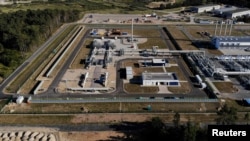One issue emerging from Russia's aggression against Ukraine is the question of energy supply. Russia supplies Ukraine as well as Central, Southern, and Western Europe with natural gas through many pipelines, several of which traverse Ukraine. As Russia’s massive military buildup around Ukraine’s borders (and in Russia-occupied Crimea and Russia-controlled parts of the Donbas) continues, Russia is also throttling gas delivery – a provocative move that it began last summer.
The U.S.-European Union Energy Council stated during its meeting on February 7 that “it is unacceptable to use energy supply as a weapon or geopolitical lever.” Thus, the United States and the European Union agreed once again to work together to address any potential threat to energy supply in the European Union or in its vicinity.
Indeed, Russia has used a stoppage of gas delivery as a cudgel in the past. “When Russia halted gas supplies to Europe over a dispute with Ukraine in 2009, people died from the cold,” said Secretary of State Antony Blinken.
“When energy supplies fail, economies falter. We’re determined to prevent that from happening and to mitigate the impact on energy supplies and prices should Russia choose to cut natural gas supplies to Europe.”
“We’re taking steps to ensure that the global energy supply isn’t disrupted – that too is an important focus – should Russia choose to weaponize its natural gas by cutting supply to Europe even more than it’s already done,” said Secretary Blinken.
“We’re in discussions with governments and major producers around the world about surging their capacity. We’re engaged in detailed conversations with our allies and partners about coordinating our response, including how best to deploy their existing energy stockpiles. All this effort is aimed at mitigating price shocks and ensuring that people in the United States, Europe, and around the world have the energy they need no matter what Russia decides to do.”
The United States and the European Union support a strong and resilient Ukraine, and both know that energy security is vital to a sovereign Ukraine.
“Energy security is tied directly to national security, regional security, global security. Europe needs reliable and affordable energy, especially in the winter months,” said Secretary Blinken. “We’re working together … to protect Europe’s energy supply against supply shocks including those that could result from further Russian aggression against Ukraine.”














